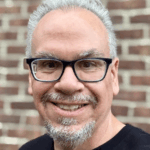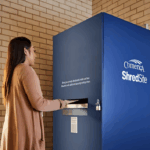
- Kim Kisner
- Business
- 07/29/2025
SBN Detroit Talks Climate Strategy with Comerica

Comerica Inc. was founded in Detroit in 1849 and remains rooted in Southeast Michigan, even as its headquarters now sit in Dallas. With 4,300 employees in the region and a strong presence across the state, the bank continues to play an active role in environmental responsibility and community impact.
SBN Detroit interviewed Scott Beckerman, Senior Vice President and Director of Corporate Sustainability, about the bank’s climate strategy, operational footprint, and the role financial institutions play in driving sustainable progress.

Q: Comerica has deep roots in Detroit, even as its headquarters are now in Dallas. How does that legacy influence the bank’s sustainability priorities in Southeast Michigan and beyond?
A: Comerica is really proud of our 175-year legacy in Detroit, and over half of our employees are here.
As a lifelong resident of the Detroit area myself, I recognize the unique environment of this region. So naturally, there is a certain connection to our desire to protect and preserve this special environment. But we also know that environmental issues aren’t just local – they are global in their nature.
I think the connection here is that we understand the importance of issues in the near-term and at the local scale but also recognize the importance of the global scale. For issues like climate change, that means our future success depends on the actions we are taking today, both here in the Detroit area and across the country.
Q: What are the most pressing environmental or climate-related risks Comerica is working to address within its operations and client services?
A: Our commitment is around three main areas: Reducing our own environmental footprint, embedding sustainability into our business, and supporting our customers’ needs.
For our own footprint, we are focused on reducing water consumption, waste generation, resource consumption, and greenhouse gas emissions. Since 2012, we’ve reduced our GHG emissions 61%, – on our way to a 65% reduction target by 2030 and moving toward our north star of 100% reduction by 2050.
For water, we’ve decreased our consumption by 48% and have also seen a 41% reduction in waste. On the resource consumption side, our focus is paper usage and since 2012 we’ve decreased that by 89%.

For our customers, we want to ensure they have access to the financial products and services they need to address the challenges they face. Maybe for a homeowner, that is a home equity loan to make their home more energy efficient or add solar to their roof. For a business, that may mean providing the financing to upgrade the efficiency of their equipment or capital improvements to a building to make it more climate resilient.
Q: Comerica has made commitments to reduce operational emissions and increase energy efficiency. Can you walk us through the key strategies being used to reach those goals — and how success is measured?
A: Our primary drive has been a focus on energy efficiency.
With roughly 400 buildings in our portfolio, this is no easy task, and no two buildings are alike. We’ve deployed a host of efficiency measures from lighting to advanced building controls to really working on driving down energy consumption, which is the largest contributor to our greenhouse gas emissions.
The other important thing is to right-size our real estate footprint while still serving our customer needs. A lot has changed with the digitalization of banking, and we simply don’t need the same amount of space that we needed in the past. So being smart about the amount of real estate we occupy has also helped us drive down our overall energy consumption. At the same time, we recognize that the shift to a digital world is not without its own set of issues, including GHG emissions, so we work with providers to ensure the majority of our technology and data center needs are powered by renewable energy.

We’re also investing in renewable energy solutions across our footprint, focused on local impacts, including piloting solar projects and REC (renewable energy certificate)-backed electricity programs in Michigan and Texas.
Q: What role does Comerica’s sustainability team play in engaging business units across such a large organization? How do you ensure consistency in implementation?
A: First, we center our sustainability program on value creation. What I mean by that is that our sustainability initiatives need to be generating value by reducing risks or costs, spurring innovation, and supporting revenue growth. If we do all that well, it enhances our reputation and brand which delivers additional value.
While it may be cliché, I think it’s true that sustainability really is the ultimate team sport. We are successful with our programs because we have the buy-in and support from colleagues across our organization.
We also support sustainability through colleague education, regional Green Teams, and volunteer-driven community programs.
Q: In your view, what’s the biggest challenge for banks — especially legacy institutions like Comerica — when it comes to embedding sustainability into the core business model?
A: For any business, there are a ton of ever-evolving business priorities, based on things like the market, customer needs, regulatory requirements, and changing technology. So, if you approach sustainability as an add-on to the traditional business priorities, then it can get pushed aside by pressing traditional business needs of the moment.
But if you embed sustainability into your core values and it becomes a part of how you do business, then it becomes a long-term source of business stability. At Comerica, we have a core value of being “A Force For Good,” which means we’ve worked to embed sustainability into how we do business. Since the establishment of our sustainability office in 2008, that means we’ve significantly reduced our environmental footprint and delivered tens of millions of dollars of cost savings.
Q: Where do you see the greatest opportunity for Comerica to lead — whether through lending practices, investments, community partnerships, or internal operations?
A: Our length of time in this space has given us a real advantage in terms of long-term impacts.
During that time, we came to recognize that to be a leader in sustainability, you can’t just focus on a single thing – you have to look at multiple points of impact. Those include our own internal operations, supporting our customers, and remaining committed to our communities. As a bank, maybe our biggest opportunity is to be there to provide the resources our individual customers and communities need.
Q: How does Comerica’s sustainability strategy align with client-facing services? Are you seeing increased demand from clients for guidance or financial products that support their own environmental goals?
A: Comerica has tracked environmentally beneficial loans, or what we call “green loans” for over a decade. We track deals in 14 different categories, including things like renewable energy, green buildings, recycling, and energy efficiency. At year’s end 2024, we stood at over $3.2 billion in green loans, up from just over $1 billion at the end of 2020. So, yes, there is a significant increase in this type of customer demand.
Q: What has been the most impactful sustainability initiative Comerica has implemented to date, and what did it take to make it happen?
A: I think it has been in the area of disclosure which is really about telling our story and why sustainability matters to us. We’ve published an annual sustainability-related report for 17 years, which I think does a couple of important things.
First it signals to our stakeholders that we respect and value our commitment to sustainability and ongoing progress. But the second and equally important part is that we believe disclosure drives action – it holds us accountable to make continued progress and motivates other companies to join us in making their own sustainable progress. Because issues like climate change are not something that Comerica can solve on its own, but we can play a part with the global community to make lasting change. I think our push to tell about our sustainability journey has helped drive progress outside of our organization, and that is the kind of force multiplier we need as we move into the future.
Be sure to subscribe to our newsletter for regular updates on sustainable business practices in and around Detroit.
Kim Kisner
- All
- Business
- Community
- Education
- Events

Unique Monique Scented Candles, a Detroit-based business founded by Monique Bounds., aims to produce candles and household products with clean ingredients and local supply chains. What began as a personal hobby during college has evolved into a full-time venture producing coconut oil and soy-based candles made with essential oils and locally sourced materials. SBN Detroit interviewed Bounds about launching a sustainable product line, sourcing challenges in Michigan, and...

Eastern Market Partnership, in collaboration with the City of Detroit’s Office of Sustainability Urban Agriculture Division, has announced $240,000 in grant funding to support Detroit-based farmers and farmer collectives. The grants will advance food access, climate education, sustainable land use, and economic opportunity, with priority given to Black- and Indigenous-led farms, youth-led initiatives, and projects rooted in historically disinvested neighborhoods. The recipients – ranging from cooperatives and community...

Citizen Robotics is a Detroit-based nonprofit that advances the use of robotics and digital manufacturing in residential construction, focusing on improving productivity, sustainability, and long-term affordability. Best known for its early work in 3D-printed housing, it explores how alternative construction methods and new financial models can reduce material waste, lower lifetime operating costs, and enhance the resilience of homes. SBN Detroit interviewed Tom Woodman, founder and president of...







